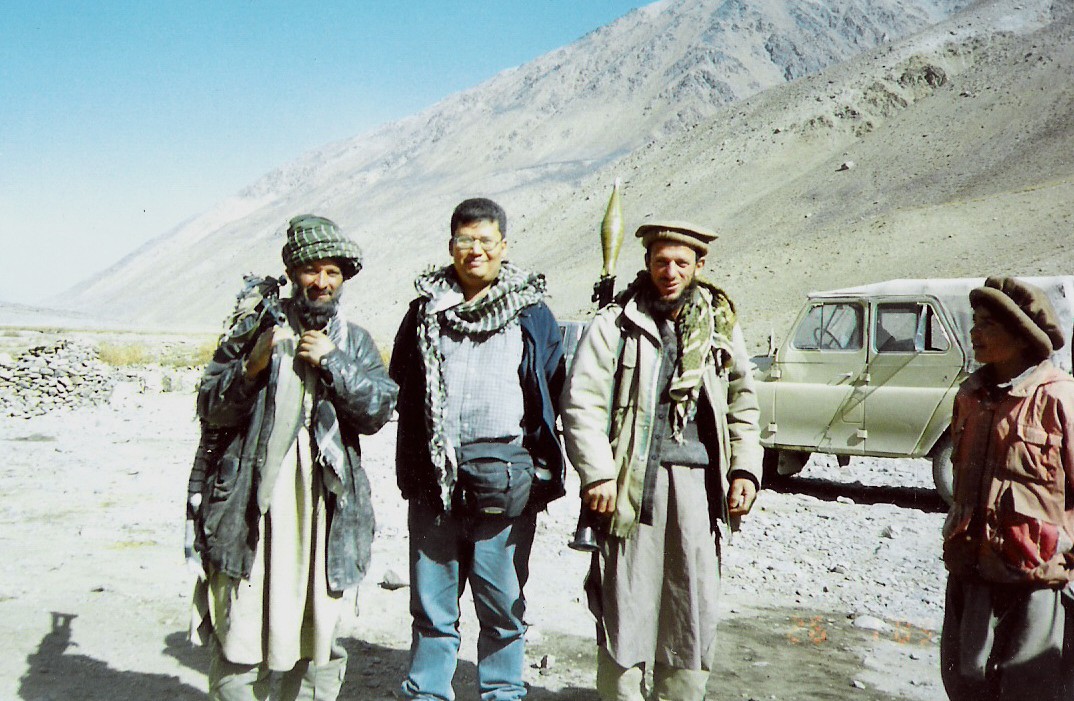BenarNews
Bangkok
 |
| ShareCommentEmailFuture Forward Party leader Thanathorn Juangroongruangkit (center), poses for a photo with people at a market in the Deep South province of Narathiwat, Sept. 13, 2019. (AFP) |
Six months after the general election, Thailand is still trying to come to terms with the shock and awe brought upon the pro-military political establishment by democratic forces.
Among these was the newcomer Future Forward Party (FFP), which struck a nerve with the armed forces by calling for a constitutional amendment and military reform.
FFP also said the army should pull out of the Deep South, where a 15-year-old separatist insurgency has claimed more than 7,000 lives, according to figures provided by researchers from Prince of Songkhla University – Pattani Campus.
In so doing – and in demanding accountability for questionable counter-insurgency tactics and alleged torture of suspected insurgents – FFP succeeded in connecting with Malay Muslims in the Deep South.
Turnout at the recent election jolted the Barisan Revolusi Nasional (BRN), the one long-standing separatist group controlling virtually all combatants on the ground.
According to sources in the movement, in the period leading up to the March 2019 vote, there was discussions among local cell leaders about boycotting it.
But the idea did not evolve into a full-fledged campaign like the August 2016 drive by BRN calling on locals to vote “no” on the referendum on the Constitution drafted by the National Council for Peace and Order (NCPO), as the junta called itself.
The referendum passed by a slim margin nationally, but the Muslim-majority Deep South strongly rejected it.
Some voters destroyed the ballot by scribbling on it. Villagers were even urged to write “Merdeka,” or “independence” on their ballot – but many feared that making such a bold statement could come back to haunt them.
Indeed, although 15 years have passed since this second wave of insurgency surfaced in the Deep South, frank and honest discussion about how the local population truly feels about self-determination is still a thing of the future. Voting “no” or destroying the ballot was the locals’ way of expressing their disagreement with the state.
A different story
But the 2019 general election tells a different story. The fact that the Muslim-majority Deep South had the highest voter turnout in the country irked the BRN.
The FFP did not win any of 13 parliamentary seats in the Deep South but earned almost three times the 30,000 votes they were expecting.
FFP’s leader, Thanathorn Jungroongruangkit, made at least four visits to the region during the campaign, generating excitement. Village boys in sarongs flocked to get a glimpse of him.
Others lined up for selfies with the leader of this start-up party that, in the view of many, helped restore faith in Thailand’s parliamentarian politics among Malay Muslims in the region.
It was a faith that pretty much disappeared following the October 2004 Tak Bai incident, when 78 demonstrators suffocated after being stacked on the back of military transport trucks.
Upset at the refusal of the Wadah faction – local Muslim parliamentarians – to speak out against the then-government, of which they were a key coalition partner, local Malays would not vote for them in the Parliament.
At the last general election, the Wadah rebranded itself, formed a party of its own and promoted greater Malay cultural space in the context of multiculturalism.
But for young voters in the region, it was FFP’s relentless assault on the military that attracted their support. Never mind that FFP was courting LGBTs and calling for gender equality – issues that don’t resonate with the conservative Deep South. Malay Muslims in the region still saw common ground.
BRN members were dumbstruck by the high voter turnout, and forced to go back to the drawing board and to contemplate what it meant for them as a “liberating force.”
Meanwhile, post-election, local politicians from various parties came together to form an ad-hoc caucus to advance the grievances of the local Muslim population.
‘Hybrid warfare’
Thailand’s powerful army chief, Gen. Apirat Kongsompong, is also frustrated at the outcome of the general election.
Unlike the BRN, Apirat took his message straight to the new wave of young politicians and the people who support them. During a recent gathering that was more like a one-man political rally, Apirat said Thailand was facing “hybrid warfare” orchestrated by “ill-intentioned politicians.”
Apirat did not mention by name the FFP leader, but the public and participants at the army conference hall understood that the message was directed at Thanathorn.
Apirat also went on at great length about the Patani conflict, saying he had lost friends and colleagues in the fight, as he hit back at Army critics.
He pointed to the spate of bomb attacks in Bangkok on Aug. 2 that was allegedly carried out by young men from the Malay-speaking Deep South. He did not blame the BRN, but suggested the masterminds were the same “ill-intentioned” people.
Most Thai security officials believe the culprits behind the attacks were BRN members and that it was the movement’s way of sending a stern warning to Bangkok to stop pressuring their leaders to come to the negotiating table.
Don Pathan is a Thailand-based security and development consultant. The opinions expressed in this commentary are those of the author and not of BenarNews.
_______________
https://www.benarnews.org/english/commentaries/far-south-view/party-inroads-10172019141435.html
https://www.benarnews.org/thai/commentary/TH-Pathan-politics-DeepSouth-10172019182439.html
